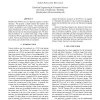Free Online Productivity Tools
i2Speak
i2Symbol
i2OCR
iTex2Img
iWeb2Print
iWeb2Shot
i2Type
iPdf2Split
iPdf2Merge
i2Bopomofo
i2Arabic
i2Style
i2Image
i2PDF
iLatex2Rtf
Sci2ools
FPL
2005
Springer
2005
Springer
Defect Tolerance in Multiple-FPGA Systems
SRAM-based FPGAs have an inherent capacity for defect tolerance. We propose a simple scheme that exploits this potential in multiple-FPGA systems. The symmetry of the system is exploited to yield a large number of possible mappings of bitstreams on FPGAs, which results in a high probability that at least one functional mapping exists. We show that the behavior of a system built using a large number of defective FPGAs approaches that of the ideal defect-free system. Various interconnection topologies such as the tree, the crossbar, and a hybrid form are compared.
Related Content
| Added | 27 Jun 2010 |
| Updated | 27 Jun 2010 |
| Type | Conference |
| Year | 2005 |
| Where | FPL |
| Authors | Zohair Hyder, John Wawrzynek |
Comments (0)

